
A Will is an essential legal document that enables people to specify how their property and assets should be transferred in the event of their demise. Wills are subject to certain laws and rules that specify their object, content, and validity requirements in the United Arab Emirates (UAE). With reference to relevant laws, rules, and publications in English and Arabic as of 2022, this article aims to provide a thorough overview of Wills in the UAE.
Object of a Will
The Object of a Will in UAE is to promote the equitable distribution of an individual’s assets and property after their demise. It enables individuals to express their freedom and decide how their assets should be distributed. A Will’s main goal is to make sure the testator’s desires are carried out while ensuring their loved ones are taken care of in the manner they intended.
MANDATORY REQUIREMENTS FOR A VALID WILL
Mandatory Contents
a. The testator’s name, nationality, and other relevant personal information should be identified in the Will.
b. The testator’s assets, including their homes, bank accounts, investments, and possessions, should be specified.
c. The testator must designate one or more executors to handle the estate’s administration and to allocate assets to beneficiaries.
d. Beneficiaries must be properly named and identified in the Will. They can be family members, friends, charitable organizations, or any other people or institutions.
e. Guardianship: If the testator has minor children, the Will must name guardians who will take care of the children.
f. Any specific requirements or restrictions on how assets should be distributed must be included by the testator.
Mandatory Conditions
a. The testator must be of sound mind at the time of writing the Will.
b. The testator must be at least 21 years old.
c. A Will must be in writing. UAE law does not recognize verbal or oral wills.
d. The Will must be signed by the testator in front of two adult witnesses who are not beneficiaries of the Will.
e. The testator’s signature must be verified by the witnesses’ signatures.
e. The Will must be registered with the appropriate forum, such as the DIFC Wills Registry, Dubai Courts, or the Abu Dhabi Judicial Department.
Where Can I Register a Will
To protect the rights of testators and their beneficiaries, the UAE provides a number of venues for people to register their Wills, each with their unique needs and procedures. However, will registered in any of these venues are equally valid across the UAE. The following are the venues where you can register a will:
Dubai International Financial Centre (DIFC)
The DIFC Wills and Probate Registry provides a specific platform for Will registration for non-Muslim expats living in the UAE. The Registry provides individuals with assurance and clarity on the distribution of their assets while operating by its own set of laws. Those looking to include common law concepts in their Wills will find this option very appealing.
Non-Muslims investing or residing in the UAE now have the option to distribute their assets and name guardians for their children in line with the directions in their Will, due to the combined initiative of the Government of Dubai and the DIFC Courts.
The DIFC Courts Wills Registry for Non-Muslims, where the register of DIFC Courts Wills is kept and where all probate issues and probate claims are processed, receives administrative support from the Wills Service.
Together, the Registry and the Wills Service offer a mechanism that guarantees that a person’s UAE assets will be transferred in line with the provisions of their legally recorded Wills. Dubai Law No. 15 of 2017 and a precise set of regulations form a system that combines operating speed, efficiency, and cost-effectiveness with the assurance of court enforcement control them.
Abu Dhabi Judicial Department (ADJD)
For the purpose of recording Wills in the Emirate of Abu Dhabi, the Abu Dhabi Judicial Department (ADJD) provides a thorough service. It guarantees the registration procedure under the new Civil Law and gives legal protection to testators and their beneficiaries.
The ADJD Wills Registry is a specialized registry that registers Wills for non-Muslim expats and is governed by the court in the Emirate of Abu Dhabi. It functions in accordance with the rules of the Emirate of Abu Dhabi. An ADJD Will covers assets located in any of the seven emirates of the UAE because the ADJD Wills Registry is governed by Civil Law. The estate of a non-Muslim will not be subject to UAE Shariah law if the person has registered an ADJD Will.
Dubai Courts Wills Service
The Will-Registration process in the emirate of Dubai is made simple by the Dubai Courts Wills Service. In compliance with Personal Status Law and regulations, testators may register their Wills. For a seamless and legitimate registration process, it is crucial to comprehend the requirements and procedures involved.
Content Mandatory for a Will in UAE
A Will is required to contain particular information regarding its content with UAE legislation. The testator (the person drafting the Will) and the intended distribution of their assets after demise should be made evident in the Will. It must include a thorough list of all assets, including real estate, bank accounts, investments, and personal property. The Will may also specify any particular guidelines or requirements for asset distribution, as well as name beneficiaries, executors, and guardians.
For a Will to be valid in the UAE, it must contain certain information. These requirements consist of:
- The Testator’s Identification: The testator’s entire name, nationality, and other relevant personal information should be included in the Will for evident identification.
- Transfer of Assets: The distribution of the testator’s assets, including their homes, bank accounts, investments, and possessions, should be specified in the Will. To prevent uncertainty, the assets should be stated in suitable detail.
- Appointment of the Executors: The testator may designate one or more executors who will be in charge of handling the estate’s administration, following the directions laid forth in the Will, and allocating assets to beneficiaries.
- Identifying Beneficiaries: The individuals who are entitled to the testator’s property may be named in the Will. Beneficiaries may be members of the testator’s family, close friends, charitable organizations, or any other people or institutions the testator chooses.
- Guardianship: If the testator has minor children, the Will may name a guardian or guardians who, in the event of the testator’s demise, will be in charge of the children’s upbringing and care.
- Particular Requirements or Conditions: Any specific requirements or restrictions on how assets should be distributed may be included by the testator. For instance, they might establish trusts, stipulate the timing of payments, or place restrictions on how inherited property may be used.
Ensure the Validity of a Will in UAE
A Will must fulfil a number of requirements to ensure the validity in accordance with the law in the United Arab Emirates. These are:
- Testator: At the time of writing the Will, the testator must be of sound mind. They should be able to comprehend the nature and effects of their choices mentally.
- Age: In the UAE, a legal Will must be written by a testator who is at least 21 years old.
- Textual Form: Whether typed or written by hand, a Will must be in writing. In general, UAE law does not recognize verbal or oral Wills.
- Witnesses and the signature: The Will must be signed by the testator in front of two adult witnesses who are both of sound mind. The witnesses shouldn’t receive anything from the will. The testator’s signature must be verified as genuine by the witnesses’ signatures.
- Registration: The Will must be registered with the appropriate body, such as the DIFC, Dubai Courts, or the Abu Dhabi Judicial Department, to ensure its enforcement. Registration entails handing the designated authority the original Will and any accompanying documentation.
- It’s vital to remember that depending on the jurisdiction within the UAE, the conditions for Will validity may change slightly. It is advisable to check the relevant Emirate’s rules and regulations as well as legal counsel.
Individuals can safeguard the validity and enforceability of their Wills in the UAE by meeting these standards, which will then provide clarity and certainty on how their assets Will be distributed after they pass away.
Important Points to Remember When You Register a Will in the UAE
Importance of competent legal advice
It is strongly advised to seek competent legal counsel regardless of the venue chosen for the registration of a Will. An attorney can offer invaluable help at every stage of the procedure, guaranteeing adherence to all the laws and rules. They can also help with the creation of a thorough Will that complies to the law and accurately captures the testator’s intentions.
Language Issues
It’s important to take the language of the Will into account when registering in the UAE. Since Arabic is the official language of the United Arab Emirates, it is best to have the Will written in English and Arabic language. However, English Wills are also allowed in some avenues, such as the DIFC Wills and ADJD. Determining the proper terminology for the particular registration forum might be assisted by seeking legal advice.
Will updating and revocation
It’s important to understand that Wills are dynamic legal instruments. Over time, circumstances might alter, requiring updates or revisions to the Will. Testators should be familiar with the steps involved in changing or voiding a registered Will in their chosen forum. This makes sure that their Will is always updated and reflects their current intentions.
Relevant Laws
Testators should be informed of the laws that apply to Wills in the United Arab Emirates. The country’s Will-related legal system is strongly influenced by Islamic concepts, particularly Sharia law. Even though some forums like the DIFC Wills and Probate Registry, and ADJD follow common law rules, it is crucial to make sure the venue matches the testator’s choices and convictions.
Accessibility for Non-Residents
It’s critical to comprehend the particular prerequisites and potential restrictions that can be present for non-UAE residents who wish to register a Will in the nation. To efficiently handle the registration process, it is imperative to seek legal assistance because some forums may have additional requirements or limits for non-resident users. Certain jurisdictions may hold certain advantages for non-residents, depending on periodic revisions of law.
Witness Requirements
In order to sign and register a Will, many registration forums in the United Arab Emirates demand the presence of witnesses. Depending on the venue, different witnesses may be required and their credentials may differ. To secure the legitimacy and enforceability of their Will, testators must comprehend and adhere to these conditions.
Testamentary capability
A person’s mental and ethical capability to make a legitimate Will is referred to as their testamentary capacity. Various registration forums may use different standards to determine testamentary capacity. To prevent any potential objections to the validity of their Will, testators must be aware of these requirements and make sure they are satisfied.
Electronic Registration
Wills may now be registered electronically at several registration forums in the United Arab Emirates thanks to technological advancements. Individuals can now remotely register their Wills, offering simplicity and accessibility. It’s crucial for everyone thinking about using electronic registration to comprehend the processes and safety precautions involved, including digital signatures and authentication.
Guardianship and Minor Beneficiaries
Wills can include provisions for the appointment of guardians for minor beneficiaries in addition to distributing assets. Testators need to be aware of the conditions and guidelines for appointing guardians in their preferred registration forum. It is vital to take into account minor beneficiaries’ best interests and make sure that the necessary arrangements are made for their care and well-being.
Make informed decisions; register your will the right way
To ensure that a person’s last desires are carried out as intended, it is crucial to register a Will in the UAE. There are many places in the UAE where Wills can be registered, including DIFC Wills, ADJD, Dubai Courts, and Notary Public. For a valid and enforceable Will that protects assets and beneficiaries’ interests, seek qualified legal assistance, take linguistic difficulties into consideration, amend the Will as necessary, and comprehend the pertinent laws. For testators looking to safeguard their assets and leave a legacy for their loved ones after their demise, understanding the individual rules and processes associated with each forum is crucial. Individuals can make informed judgments based on their own circumstances and preferences by investigating the many registration possibilities.
Will registration process
Wills must be registered in the UAE in order for its enforceability to be ensured. The procedure entails delivering the Will and any necessary accompanying documentation to the appropriate authority. The registration enables both the formation of a legal record and the legality of the Will to be confirmed. For more detailed information, read A UAE Will: Critical for Asset Preservation and Family Well-being
Probate and asset distribution
The distribution of assets upon the testator’s demise takes place in accordance with the terms of the Will’s registration. The Will’s designated executor is in charge of managing the estate and making sure the testator’s wishes are carried out. The UAE courts have the authority to resolve inheritance issues in the event of disagreements or contestation.
Revoke and amendment of Will
During their lifetime, a testator has the option of amending or revoking their registered Will. A Will can be openly revoked by writing a new one or by destroying an existing one with the intent to do so. Codicils, which are independent legal documents that alter particular clauses in the original Will, can be used to make amendments. To ensure the legitimacy of revocation and amendment, it is crucial to adhere to legal standards..
Succession in the absence of a registered Will
The laws of intestate succession, as specified in the Personal Status Law and Federal Law No. 5 of 1985 concerning Civil Transactions, will apply to an estate if a person dies without leaving a valid registered Will. According to their relationship to the deceased, the legal heirs shall get the assets according to the intestate succession.
Foreign Wills
In certain circumstances and under certain restrictions, the UAE accepts foreign Wills. Under certain circumstances, including satisfying the legal requirements of the testator’s home jurisdiction and obtaining the required permissions from UAE courts, a Will that was properly executed in the testator’s home jurisdiction may be recognized and enforceable in the UAE.
When the Will conflicts with the Shariah law
In the UAE, inheritance-related issues are governed by Islamic Sharia law. Disputes could occur when a Will contains clauses that go against Sharia law. The UAE courts have the power to settle these conflicts and render judgments in accordance with pertinent legislative requirements and Sharia principles.
Legal counsel and professional assistance
Making a Will can be a challenging procedure, especially in light of the many asset types, family dynamics, and legal requirements. It is recommended to get legal counsel from knowledgeable experts familiar with the Wills-related laws and regulations of the UAE. Your Will can be properly designed, executed, and registered by working with an expert attorney or law firm, reducing the possibility of disagreements in the future.
Keep in mind that Will-related laws and regulations are subject to change, so it is crucial to refer to the most recent sources and obtain qualified legal counsel for precise and detailed information depending on your unique situation.
To protect your assets and make sure that your intentions are carried out in compliance with the relevant laws and regulations, it is essential to ensure the validity and appropriate execution of a Will in the UAE.
A Will serves as a vital legal instrument for individuals in the UAE to dictate the distribution of their assets upon their demise. By adhering to the object, content, and validity requirements outlined by UAE laws, individuals can ensure that their wishes are respected. Understanding the legal provisions and registration process is crucial to guarantee the enforceability of a Will in the UAE, providing peace of mind to testators and their beneficiaries.
It’s crucial to see a lawyer if you’re thinking about creating a Will in the UAE to make sure it is legal and suits your needs. You can get assistance from a lawyer in selecting the best will type for your needs.
Listed below are some more details you might find useful:
- Who is eligible to create a Will in the United Arab Emirates?
In the UAE, a Will may be written by any adult who is of sound mind and over the age of 21.
- What happens in the UAE if I pass away without a valid and registered Will?
In the UAE, if you pass away without leaving a Will, your assets will be allocated in accordance with the laws of inheritance. These regulations, which have their roots in Islamic law, can be intricate. Registering a Will is essential if you want to guarantee that your property is transferred according to your wishes.
- What are the costs of making a Will in the UAE?
The price of a Will in the United Arab Emirates varies based on the type of Will you select and the lawyer you engage. However, costs are typically not very high.
Here are some additional factors to think about when creating a Will in the UAE:
-
- Appointing an executor: An executor is the person in charge of carrying out the instructions in your Will. It’s crucial to pick an executor you can trust to handle your estate’s affairs.
- Children’s guardians: If you have minor children, you can appoint guardians who can look after your minor children. Their name will be mentioned in the will. If you pass away, guardians will be in charge of your children’s care and upbringing.
- Taxes: You can occasionally have to pay taxes on your estate after you pass away. It is crucial to consult a lawyer to make sure you comprehend the tax repercussions of your Will.
- Reviewing your Will on a frequent basis will help ensure that it still accurately reflects your intentions. If your situation changes, such as if you get married, divorced, or have children, you would want to reevaluate your Will.



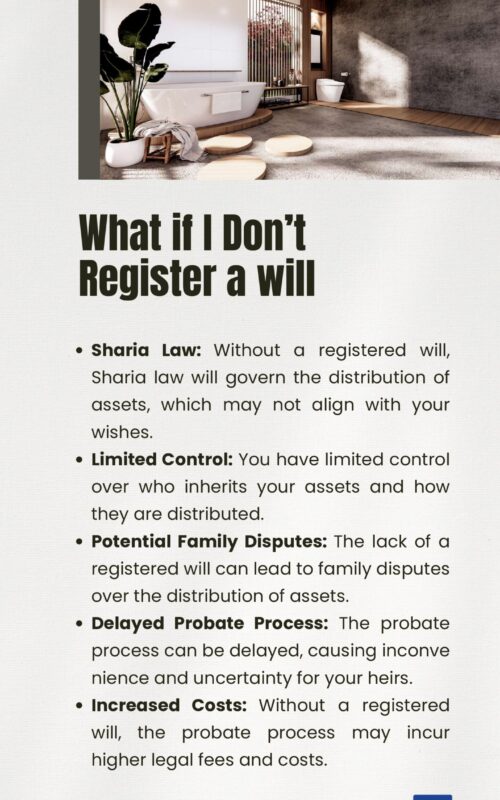
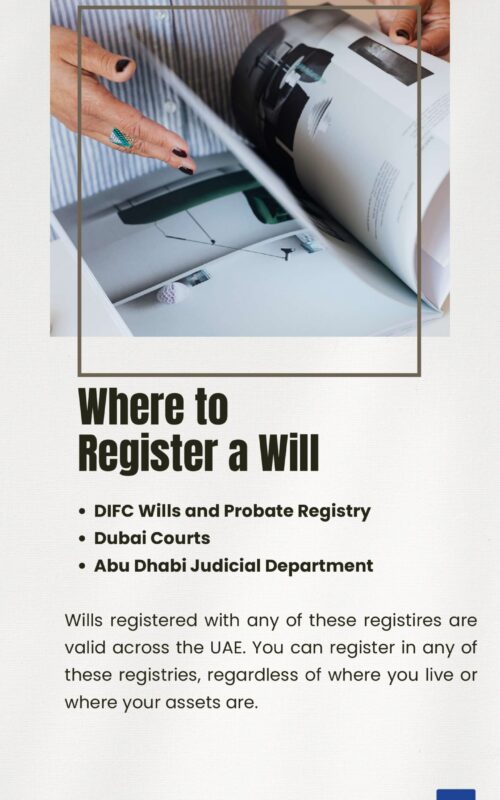
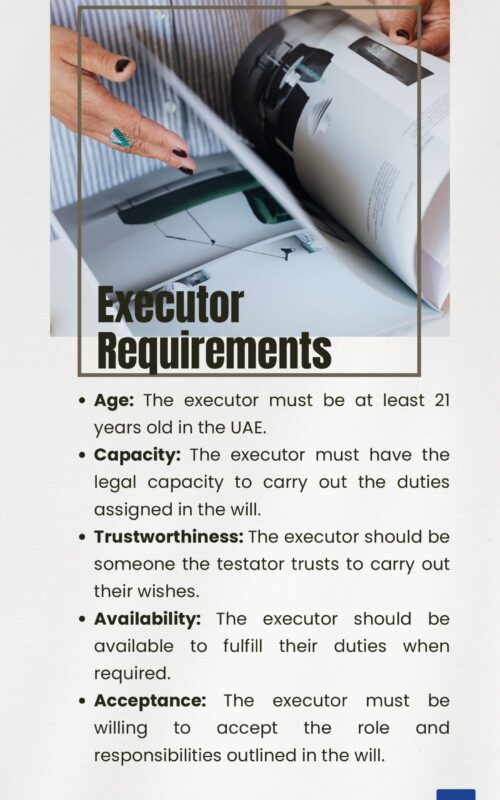
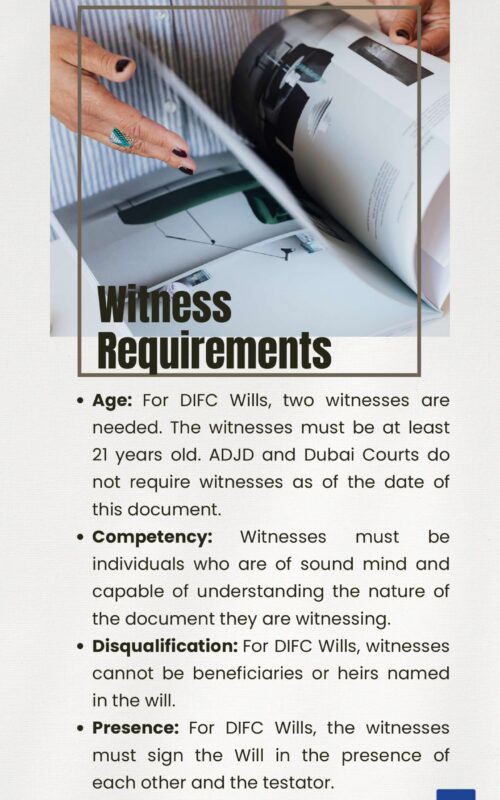
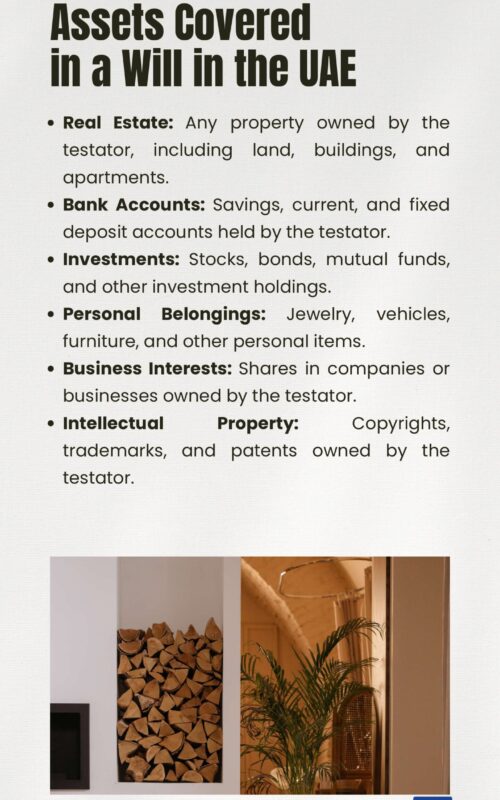
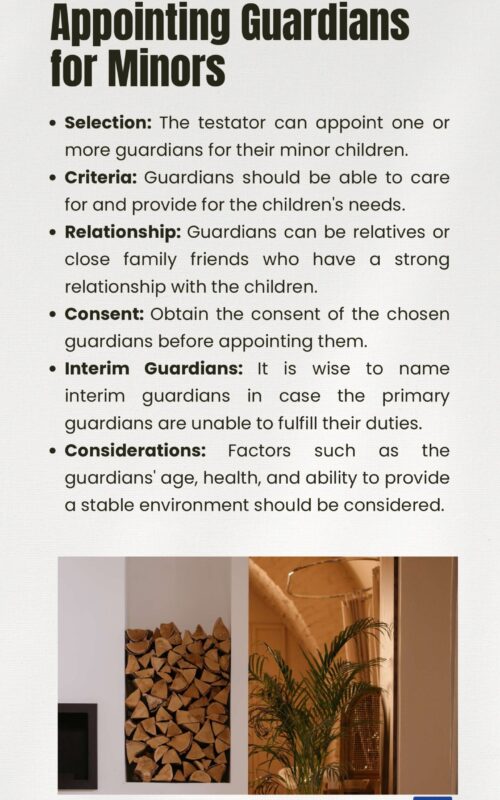
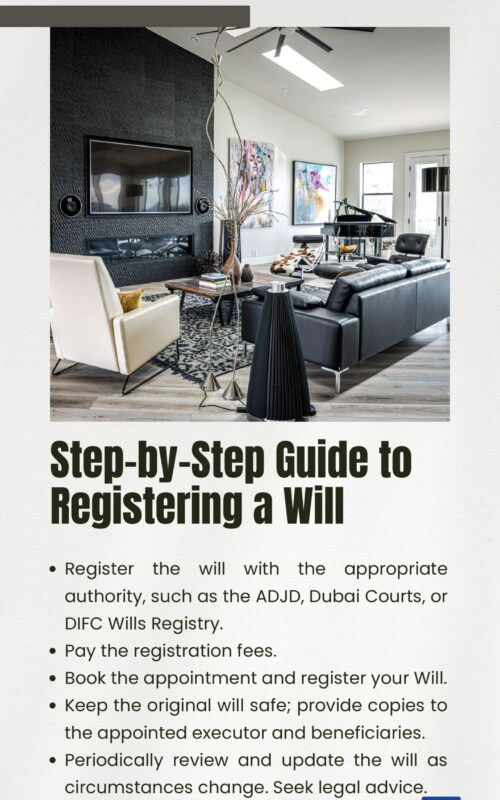
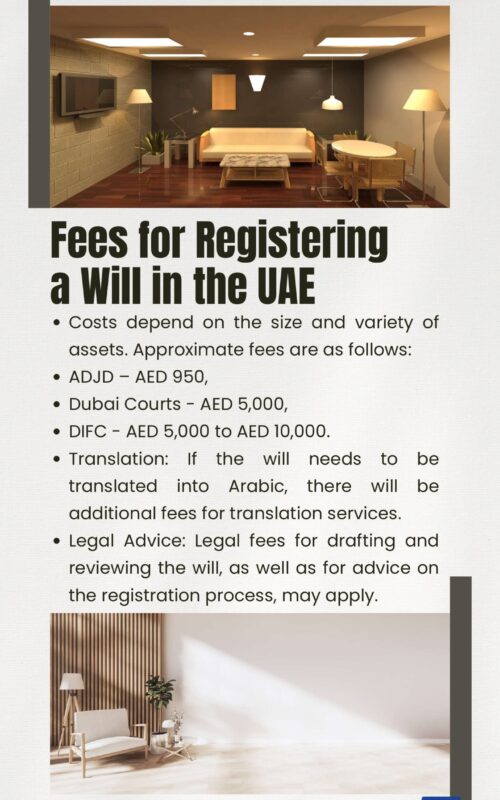

2 comments
Editor
October 27, 2023 at 10:42 am
Dear David,
Your requirement was forwarded to our Wills & Probate department. We hope it was addressed properly. Please let us know if you have any concerns. Wishing you and family a happy, prosperous life partaking in the amazing life and business this wonderful country UAE offers.
Editor
March 25, 2024 at 4:21 pm
Thank you. Can we help you in any way?